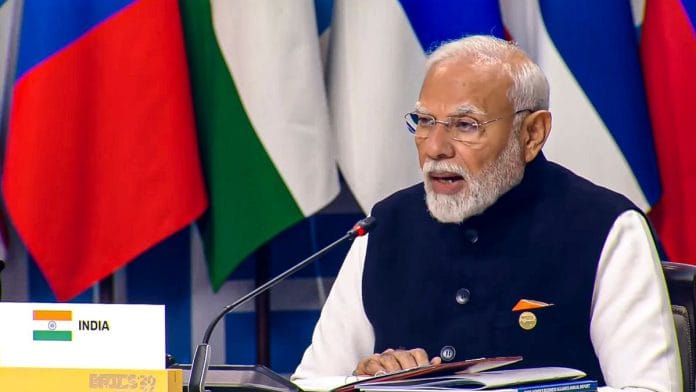New Delhi: Prime Minister Narendra Modi Wednesday said India was ready to welcome more “partner countries” to BRICS as long as all decisions in this regard were taken “unanimously”.
Making a veiled reference to Russia and China’s tacit support of Pakistan’s entry into the nine-member grouping, Modi remarked at the closed plenary session of the 16th BRICS summit that the views of the founding members of BRICS should be respected. Apart from Russia and China, the other two founding countries are India and Brazil.
The Prime Minister, who is in Russia’s Kazan for the conclave, outlined New Delhi’s position on the expansion of the organisation, which welcomed four new members this year—Ethiopia, the United Arab Emirates (UAE), Iran and Egypt.
“The guiding principles, standards, criteria and procedures that we adopted in the Johannesburg Summit should be followed by all member and partner countries,” Modi said. Among other things, these principles had emphasised the need to make all decisions by consensus in the expansion process, with views of founding members respected.
There are over 30 countries interested in joining the organisation, including Colombia, Sri Lanka, Pakistan and Turkey. The grouping founded by Brazil, Russia, India and China welcomed South Africa in 2011, and has now expanded further with the addition of the four new members.
It is understood that Russia and China are in support of Islamabad’s interest to join, with Russian deputy prime minister Alexey Overchuk publicly backing Pakistan’s bid in September.
However, ties between India and Pakistan have been historically fraught, with the two countries currently having no diplomatic representation at the high commissioner level in either country.
‘No double standards on terrorism’
At the closed plenary, Modi also called for a “single minded” focus on combating terrorism and terror financing by BRICS members, adding there was “no place for double standards” on this issue. “We need to take active steps to stop radicalisation of youth in our countries,” added the Prime Minister.
Incidentally, China last year blocked a UN move to designate Pakistan-based LeT terrorist Sajid Mir, wanted for his involvement in the 26/11 Mumbai terrorist attacks, as a “global terrorist”.
Modi reiterated India’s position for “dialogue and diplomacy” and not war—a reference to his comments during the bilateral meeting with Russian President Vladimir Putin on Tuesday, where he had pushed for diplomacy to end Moscow’s war with Ukraine.
UN & WTO reform
The prime minister’s speech also underscored that the world was looking towards BRICS and that it should be “people-centric” to show it was not a “divisive organisation, but one that works in the interest of humanity”.
Modi mentioned the challenges faced by the global community, such as “wars, economic uncertainty, climate change and terrorism”.
“At such a time, there are high expectations from BRICS. I believe that as a diverse and inclusive platform, BRICS can play a positive role in all areas… BRICS is an organisation which is willing to evolve with time,” Modi said.
The Indian leader added: “By giving our own example to the world ,we must collectively and in a united manner raise our voice for reforms of global institutions. We must move forward in a time-bound manner on reforms in institutions such as the UN Security Council, multilateral development banks, and the WTO.”
Modi cautioned BRICS leaders to be “careful” so that they are not seen as aiming to “replace” the current international order, but rather reform it in the light of current global realities. The organisation has faced questions regarding its character, with critics labelling it as anti-West, especially with the burgeoning diplomatic partnership between China and Russia.
India has maintained it is “non-West, not anti-West”, a configuration that is important as it deepens its partnership with western powers such as the US, while also maintaining its traditional relationship with Russia.
(Edited by Tikli Basu)
Also read: Payment systems, BRICS expansion & bilateral meets. What to expect as Modi heads to Russia






